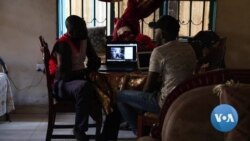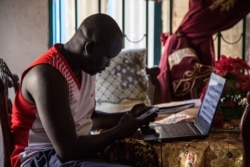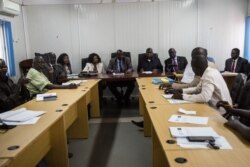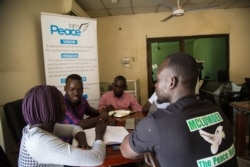Thirty-one-year-old Junior Dau sits in the parlor of his home in the South Sudanese capital of Juba, gazing at photos of his slain cousin. The cousin was killed as a soldier fighting in the civil war that broke out in 2013.
"He got shot in the chest and in the leg in an ambush," Dau told VOA. "[His death] hit me so much because one thing I know is he was more than a brother to me and he managed to help me through my studies."
Losing a breadwinner made life difficult for Dau's family. Three of his siblings also died and his mother was tortured when rebel fighters dunked her into a water tank.
"My mom was put in the water; she fainted four times and that is one thing that has made her not come back to South Sudan. She hates it so much," Dau said. His mother now lives in Kenya as a refugee; he hasn't seen her since 2016.
After losing so many family members to the conflict, Dau said he was left with smoldering resentment and bitterness toward other ethnic communities in South Sudan. "I had in mind, I want to get a gun so I can get revenge," he said.
Can South Sudan's people reconcile?
The people of South Sudan have endured decades of war, first in the fight to win independence from Sudan, and then in a brutal conflict that began in late 2013. An estimated 400,000 people died in the civil war, which officially ended with a 2018 peace agreement.
The intense fighting has left deep scars on the nation, with ethnic communities pitted against one another.
In February, rival politicians President Salva Kiir and former deputy Riek Machar formed a transitional unity government after more than a year of negotiation and delay.
Dr. James Okuk, a professor of political science at the University of Juba, said he is cautiously optimistic about the recent formation of the unity government.
"It is a start, but the task is overwhelming. We hope they will be up to the task, particularly reconciliation, which really requires a lot of time, requires a lot of effort," he said.
"The political leaders have created these grievances by making the civilians to take sides in these political quarrels, and taking sides has created these enmities among communities and with peace coming back, I think it's time to mend those broken relations."
The government recently set up a National Dialogue Committee in an effort to mend broken relations. Francis Deng, South Sudan's first ambassador to the United Nations and a scholar on conflict management, is putting his expertise to use as a member of the committee.
He said tackling complex issues such as how to administer justice for war-related atrocities will not be easy.
"One line of reasoning is let's forgive and forget. That's one line of reasoning. The other line of reasoning is that too much harm has been done, people have been victimized, massacres have taken place. Crimes have taken place. Here you come to another point of view. The African perspective generally is to try to reconcile, maybe compensate and not talk in terms of punishment," Deng said.
The government is now promoting what Deng describes as the African approach toward reconciliation. On the streets of Juba, several peace campaign billboards display phrases such as, "It's time to forgive."
Peace-building programs
Other government-backed and private initiatives are in place to help move toward peace-building.
At the University of Juba, students meet under a large tree on campus every week to learn about how to give psychosocial support to those dealing with bitterness. The class is organized by Vivean Peter, a 33-year-old woman who had her own pain to work through after a rival ethnic group gunned down her husband.
Now, Peter finds hope and healing in training therapists. She takes a particular interest in helping counsel youth who can easily join militia forces to exact revenge.
"They are the most vulnerable demographic, needing psychological support," she explained.
Another program called Power to Forgive, set up by the South Sudanese Council of Churches, offers a telephone hotline service. People from across the country who are coping with anger and war-related trauma call in to speak with a trained counselor.
A popular clergyman known in the community simply as Pastor Emmanuel said, "That is the role the Church plays, to reconcile back to God and to reconcile people with themselves and with others."
In another part of Juba, young activists are organizing an event called Peace Camp. It offers a safe space for young people to talk about the pain of the war.
The organizer, Lupai Samuel Stephen, was displaced by the war and grew up in Uganda. He said the Peace Camp is more relevant now than ever.
"The Peace Camp brings people together to be able to create relationships on a personal level, so you get to meet someone from a certain community that you always looked at as an enemy," he said. "We know there are a lot of cultural influences in this conflict based on tribalism, hate speech and negative stereotypes, and we believe the best way we can break all these stereotypes is when we actually bring people together to talk about it and that becomes a basis for other people to learn from the other's perspective."
Junior Dau participated in a Peace Camp and said it helped him to let go of his hatred. He's now a Peace Camp ambassador.
Even though many of his friends and relatives have died, Dau said he enjoys spending time with the ones who have survived.











